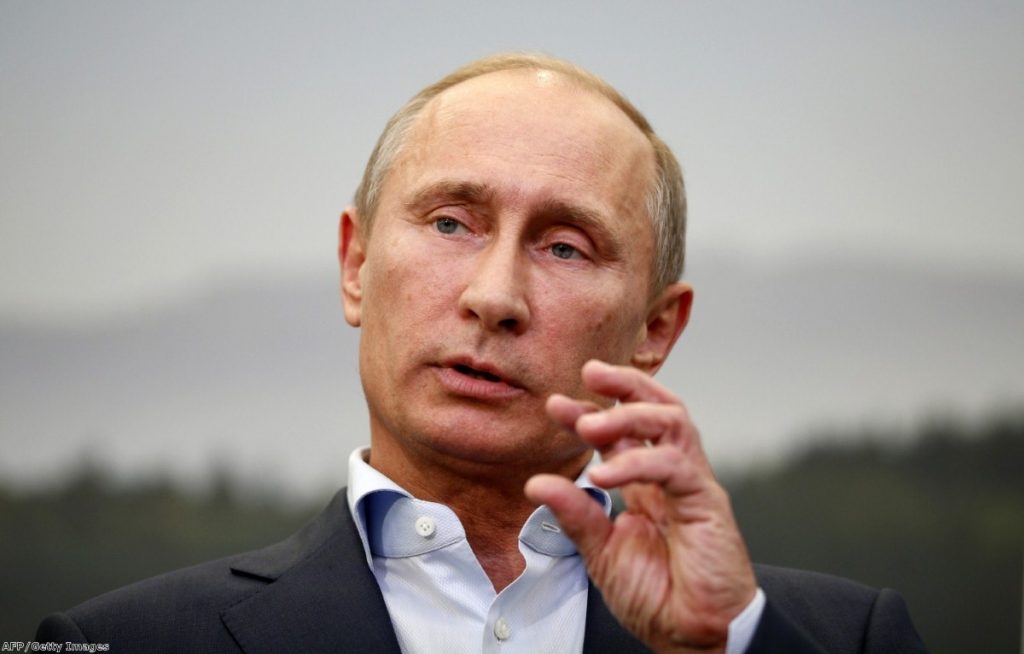The Week in Review: Putin the boot in
David Cameron's press conference with Vladimir Putin on Sunday did not bode well. They are a tremendously odd pair. The old Etonian towers over his Russian counterpart, whose he's-had-work-done face never seems to smile or respond to visual stimuli. Cameron's ruling class charms means his manners are impeccable, even when confronting fundamental disagreement. The same cannot really be said for the Russian president. "One should hardly back those who kill their enemies and eat their organs," he said. It was not the traditional language of the joint press conference. "Do we want to support these people? Do we want to supply arms to these people?"
Dave's eyes grew a little weary. His upcoming G8 summit was plainly going to be difficult.
Things weren't helped the next day when the Guardian released details of how British intelligence agencies spy on people coming to international summits. It was like rolling out a welcome mat covered in dog turd. Much of the press reacted with a practiced 'is the Pope Catholic' line, but the details were fascinating. What with Putin on the one hand and spies on the other, it was fixing up to be the least cosy international summit for some time.
As ever, Dave's friends were there to stab him in the back and then pose for pictures. Nick Clegg and Boris Johnson explicitly came out against his plans to arm the rebels in Syria. Boris, it must be said, did so rather well, with a cogent and evocative Telegraph column. At least 81 Tory MPs agree, as does the Labour leadership and much of the Foreign Office. The Americans are committed to arming rebels, but Barack Obama has as much interest talking about it in public as he does his youthful dalliance with illegal narcotics.


Putin may have been the G1 in terms of policy towards Syria, but he had the advantage of consistency and clarity. He was going to keep on arming Assad and he was going to keep on opposing arming the rebels. For the Russian Leader, things were simple. Among his fellow leaders, confusion and trepidation reigned.
Cameron had to think big, to go outside the box, so he made the summit go tieless. It was the most significant fashion moment for international relations since Tony Blair wore trousers which literally showed the outline of his genitals. The idea was that the informal atmosphere might encourage consensus and keep people relaxed. They purposefully held talks around a small, elbows-touching table to encourage intimacy. Officials were banished from the evening conversation. It was just the eight leaders in a room, without translators, speaking languages no-one else in the room understands.
For some reason, the resulting agreements were not very impressive. Measures on corporate tax transparency were rather limited by the fact that they did not include public access. It was the most radical transparency agenda which had ever not been seen.
The situation in Syria got a seven-point plan, which pleased almost no-one but did have an impressive level of tactical compromise.
On the one hand, Cameron retreated from the UK's government's position of a year ago by removing the name Assad from the description of the transitional government. That meant his departure was not a precondition and suggested Putin had made some leg-way in negotiations.
On the other hand, Cameron was able to present a picture of continuity which would have been reassuring to the people keeping the state institutions ticking over. That doesn't seem particularly impressive, but you can see what he's aiming at. The prime minister was effectively promoting a coup, telling Assad loyalists they could get rid of their boss without putting themselves in too much jeopardy.
Cameron gave to Putin with one hand in order to open up the possibility of a second front with the other. Will it work? Almost certainly not. But it was a pragmatic accomplishment for a situation with no good side.
Northern Ireland's G8 summit was not destined to go down in history as a game-changer, that much was for sure. Or so we thought. A day or two after it ended, it emerged that Obama had spent much of his speech at the summit mistaking chancellor George Osborne with black Rhode-Island soul singer Jeffrey Osborne. "I'm sorry man. I must have confused you with my favourite R&B singer," he said. Osborne tried to take it light-heartedly, but it said a lot that Obama basically had no idea who he was.
It doesn't matter. Gideon's got a new name. It's Jeffrey. We're calling him Jeffrey from now on.

